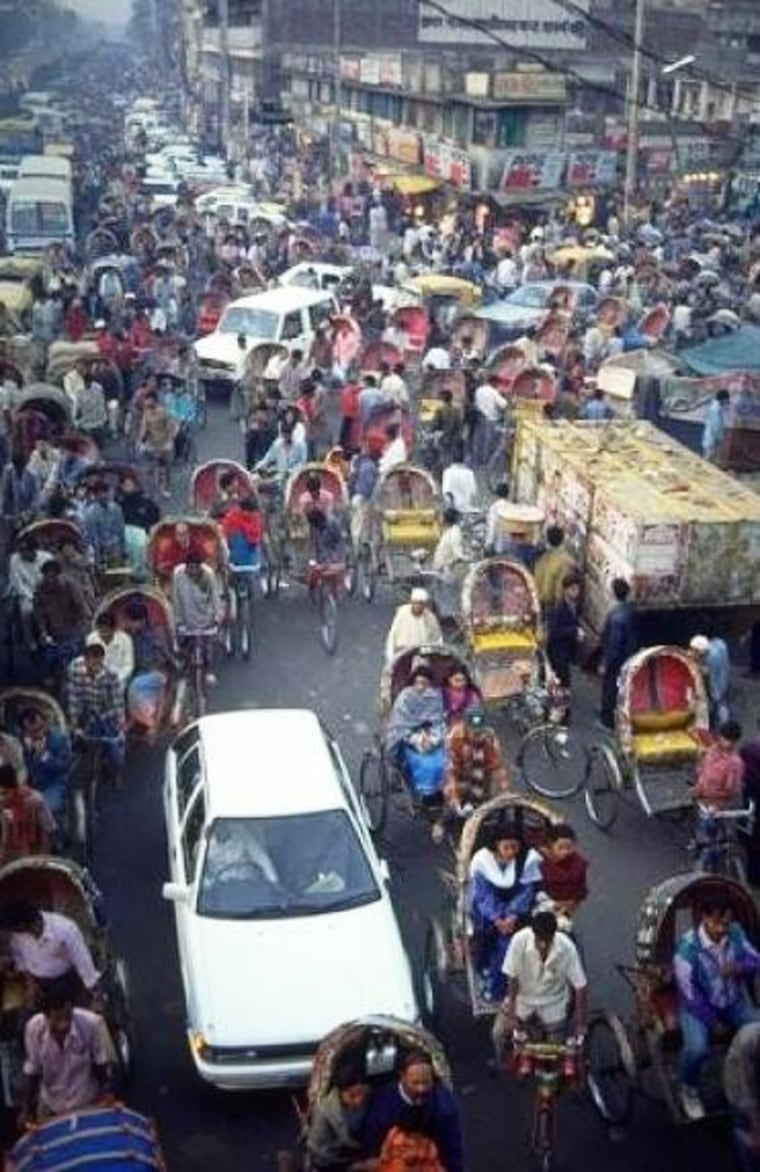Some futurists predict that the next few decades will bring about wondrous revolutions in genetics and robotics, leading to resolutions of all the problems that afflict us today. But what if those revolutions don't work?
The darker visions for the next 40 years — widespread food and water shortages, a proliferation of failed governments, millions of "environmental refugees" fleeing to northern countries — came into the spotlight over the weekend at the annual meeting of the American Association for the Advancement of Science in Washington.
The year 2050 was the focus for the debate, because that's when experts have projected that the world's population will top out at 9 billion people. The big question is, how much heartache will humanity have to go through by the time it gets to 2050?
Unless current trends change, "by 2050 we will not have a planet left that is recognizable," said Jason Clay, the World Wildlife Fund's senior vice president for market transformation.
"If we don't get food right — where we produce it, and how we produce it — we can simply turn off the lights and go home," Clay told reporters.
Food issues on the rise
So what's not right about food? Based on an analysis of Earth's resources, our planet should be able to sustain 11 billion people on a vegetarian diet, said Joel Cohen, a population expert at the Rockefeller University. But among the current population of 7 billion, "a billion of those are hungry" already, he said. One of the reasons he sees is that humans are sharing their agricultural grains with livestock as well as machines (in the form of feedstock for biofuel conversion).
"We're using less than half of the cereal we grow to feed humans," Cohen said.
African countries are expected to be flashpoints for future flare-ups involving food shortages and populations on the rise, but if climate change continues on its current track, that could bring about an increasingly international crisis. Cristina Tirado, a public health expert at the University of California at Los Angeles, said the United Nations has projected the northward movement of 50 million "environmental refugees" by the year 2020, due to the negative effects of climate change on food security.
"When people are not living in sustainable conditions, they migrate," she explained.
There's already an increased influx of migrants from Africa to southern Europe — and Clay said he expected to see three or four "failed states due to food prices." You could argue that such a failure has taken place already, in the form of the Tunisian government's recent fall.
"Most of the conflict is going to be domestic," Clay said. "I don't think it's going to be international for a while."
The food fix?
So what is to be done? Clay said one part of the equation is to get serious about reforming agriculture, on a scale at least as big as the "green revolution" of the 1960s. "What we need to do is freeze the footprint of food — and then make [agriculture] more efficient," he said.
That means reducing the greenhouse-gas footprint of the agricultural production cycle, and it also means trimming back on the amount of energy, fertilizer and irrigation required to grow crops. The experts also said the shift toward converting food (such as corn) into biofuel should be reversed.
That's just one side of the equation, however. The solution also has to include methods to slow down population growth, such as family planning education in the developing world. John Casterline, director of the Initiative in Population Research at Ohio State University, said there are "high levels of unmet need for family planning" around the world. He cited figures indicating that one-fifth of married women in the developing world have unintended pregnancies, a proportion that goes up to a fourth in sub-Saharan Africa.
The idea of funding international family planning programs has been controversial in the United States, but the experts voiced hope that such efforts would gain more support as the planet rolls toward 2050.
Casterline noted that the best antidote to overpopulation woes appeared to be economic stability rather than misery. "It looks like when things get better, families get smaller," he told me.
Will things get better between now and 2050? Optimists such as inventor/futurist Ray Kurzweil are betting that rapidly accelerating technology will save us, but the population experts say their projections have to account for many factors, including advances in dealing with aging. If the average life expectancy heads toward 100 years by the year 2100, as some project, that would make for a more complicated century. The Population Council's John Bongaarts said some of the forecasts call for a peak population of as much as 13 billion.
"If I had to bet, I would bet on nine and a half billion by 2075," Bongaarts said.
How do you feel about the world in 2050 ... or 2075, for that matter? Optimistic or pessimistic? Weigh in with your comments below.
More on population policy:
- Muslim world's birth rate falling, experts say
- Census: U.S. population growth slowest since 1940
- Technology helps China brace for population growth
- WHO ties population, sex, farming to new ills
Join the Cosmic Log community by clicking the "like" button on our Facebook page or by following msnbc.com science editor Alan Boyle as b0yle on Twitter. To learn more about Alan Boyle's book on Pluto and the search for planets, check out the website for "The Case for Pluto."
